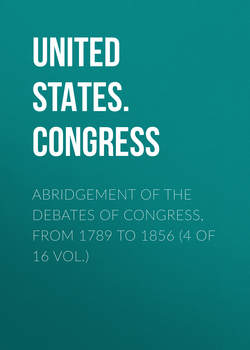Читать книгу Abridgement of the Debates of Congress, from 1789 to 1856 (4 of 16 vol.) - United States. Congress - Страница 65
TENTH CONGRESS. – SECOND SESSION.
PROCEEDINGS AND DEBATES
IN
THE HOUSE OF REPRESENTATIVES
Thursday, February 9
ОглавлениеNon-Intercourse
Mr. Taylor said it would be recollected that, in the course of the public business of this session, a resolution reported by a committee on our foreign relations arising out of a motion of a member from North Carolina, for the purpose of interdicting commercial intercourse with such belligerents as had in force decrees or edicts against the lawful commerce of the United States, had been agreed to and referred to the same committee, who had reported a bill for non-intercourse. This bill in fact, however, comprised but one-half of the whole subject embraced by the words "non-intercourse." The bill as reported to this House provided for the non-importation of the goods, wares, and merchandise, the growth and manufacture of these particular countries. That (said he) may be readily accounted for, from the circumstance that the House was then actually engaged in passing a law for the enforcement of the embargo, the committee therefore having only in view the other part of the question, so as to complete a non-intercourse. After that bill was reported, a gentleman from Tennessee, (Mr. Rhea,) in order that the whole might be incorporated into one, offered a resolution for that purpose. I did think it unnecessary at that time; but as the course of business seems to look towards a repeal of the embargo, in order that the whole subject of non-intercourse may be incorporated in the bill before the House, I move that the Committee of the Whole be discharged from the consideration of the bill, and that it may be referred to a committee, in order that it may be made in fact what the title imports it to be, completely, a bill for non-intercourse between this country and those nations having in force decrees affecting our neutral rights.
The Committee of the Whole was discharged from the further consideration of the bill, ayes 72.
The effect of the votes of this day, is to refer to the Committee on Foreign Relations, composed of Messrs. G. W. Campbell, Nicholas, Bacon, Taylor, Fisk, J. Montgomery, Mumford, Champion, and Porter, the several propositions for the repeal of the embargo, for arming the merchant vessels, for non-intercourse, for excluding armed vessels from our waters, and for declaring the first capture made in violation of the neutral rights of the United States to be a declaration of war, &c., with leave to report by bill.
The chief argument in favor of this general reference was, that these propositions might be merged in one bill which should present a general system, and thus render less complicated the proceedings of the House on these resolutions. The main arguments against it were, that it would destroy all that had already been done in Committee of the Whole, and probably present a system at length to the House which would not be approved, and thus produce no other effect at this late period of the session than to protract discussion; and also that it would encourage that speculation now going on in the mercantile towns, and be ruinous to many men of moderate capitals who had embarked their all in the purchase of produce, in the certainty that the embargo would be raised on the 4th of March.
